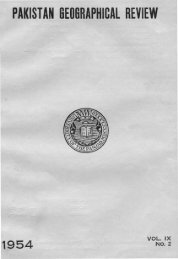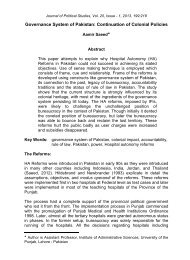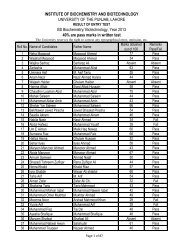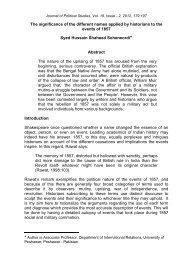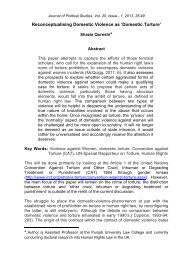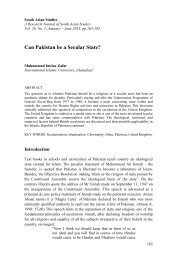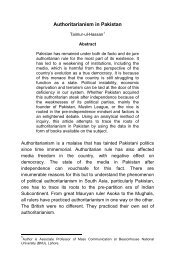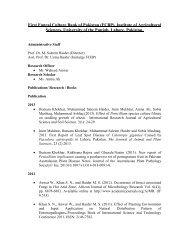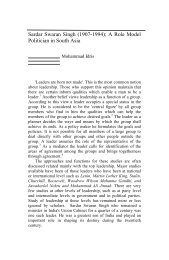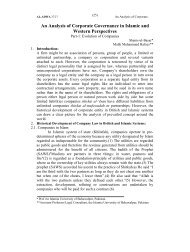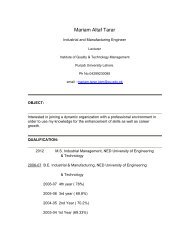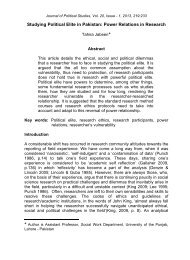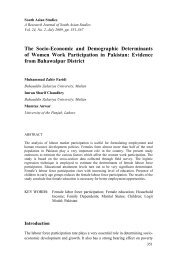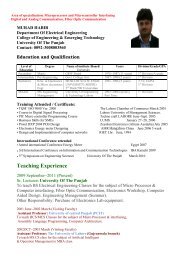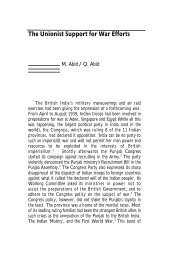4. Dr. Amir M. Haji Yousefi_January-June 2012
4. Dr. Amir M. Haji Yousefi_January-June 2012
4. Dr. Amir M. Haji Yousefi_January-June 2012
You also want an ePaper? Increase the reach of your titles
YUMPU automatically turns print PDFs into web optimized ePapers that Google loves.
South Asian Studies 27 (1)<br />
Qaida are made in this context.( Iran: Afghanistan is Barometer of U.S.<br />
Relationship, 2009).<br />
It may seem logical to say that since Iran is faced with two enemies in<br />
Afghanistan i.e., the U.S. on the one hand and the Taliban on the other, she must<br />
adopt a policy in the war between its two enemies that guarantee that neither the<br />
U.S. nor the Taliban would win the war (Dehghani, 2009: 486), however, it is<br />
almost impossible to prove with hard evidence that Iran has helped its ideological<br />
enemy. The main reason for proving such claim is that since Taliban is acting in<br />
opposition to the U.S. which may fulfill Iran’s interests and inflict damage to the<br />
American forces, Iran is helping arm the Taliban in Pakistan-Afghanistan borders.<br />
Obviously, due to Iran’s legitimate security concerns, it seems rational for her<br />
to oppose the long-term presence of the U.S. troops in Afghanistan in any form (in<br />
the present form which is the continuation of the occupation or in the form of<br />
establishing military bases). We may say that, as Holiday claims, Iran was waiting<br />
eagerly for a third party such as the U.S. to enter Afghanistan and overthrow the<br />
Taliban government (Holiday, 2001), but long-term presence of the U.S. in<br />
Afghanistan is definitely considered by Iranian authorities a serious security threat<br />
to Tehran. Therefore, it seems that for the foreseeable future Iran will insists on its<br />
belief that the occupying forces have to leave Afghanistan and that a regional<br />
solution is the most feasible one. Failure of the U.S. and the Western countries in<br />
Afghanistan to bring about security in that country after ten years of occupation<br />
supports the Iranian standpoint.<br />
Iran & the U.S. (the West) in Afghanistan: Cooperation,<br />
Confrontation, or Competition?<br />
In this section we seek to speculate about the future of Iran-U.S. relationship in<br />
Afghanistan. Our main question is what is the prospect of Iran-U.S. relation in<br />
Afghanistan? Would it be cooperative, confrontational or competitive? This article<br />
argues that because of different goals and interests of the U.S. and Iran in<br />
Afghanistan, on one hand, and their differences regarding other regional and<br />
international issues on the other, the most probable scenario would be the<br />
continuation of Iran-U.S. competition and maybe confrontation not cooperation in<br />
Afghanistan.<br />
After 10 years of the presence of American and NATO forces in Afghanistan,<br />
the security situation there has not only not improved but deteriorated. Taliban<br />
forces set up military operations against the foreign troops almost every day and<br />
have the capability to inflict severe damages on them. They use road-side bombs<br />
to set on blast foreign convoys and kill many American as well as other foreign<br />
country military forces. Recently the American and NATO authorities have<br />
realised that they have to adopt a new policy in order to confront the Taliban<br />
attacks and bring about security in Afghanistan.<br />
70



